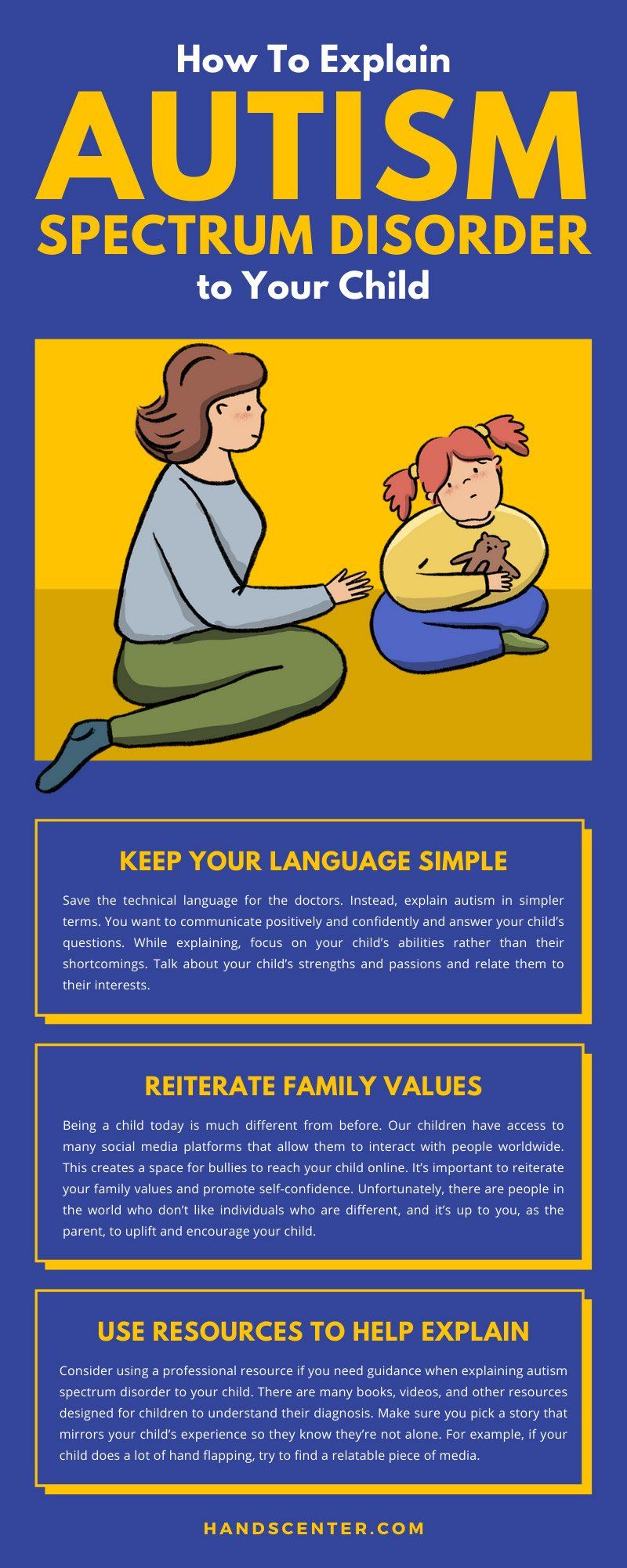How To Explain Autism Spectrum Disorder to Your Child
For some parents, learning that their child has autism can be a shock or a relief. Whether or not you expected the diagnosis, many parents struggle with adjusting to different developmental styles and ways they can support their child. Parents may also struggle with the thought of one day explaining autism spectrum disorder (ASD) to their child.
Many parents fear that labeling their child as someone with autism may make them feel left out, broken, or that they have an excuse to give up. However, that’s the exact opposite. Explaining ASD to your child will help them understand why they have certain challenges and how they can overcome them.
Discussing an autism spectrum disorder diagnosis with your child might be one of the most important things you can do for them. By explaining ASD to them, you provide resources and techniques to help guide and assist your child towards success. This article will help you learn how to explain autism spectrum disorder to your child.
Why Should You Explain It?
Parents may go through a wide range of emotions when they learn about their child’s diagnosis. However, it is imperative that you find support that can assist you through this new journey, like
autism therapy services and parent training groups. Children with autism should have an appropriate support group who understands their disorder and can help guide them through new coping mechanisms.
Children with autism spectrum disorder should accept and embrace what makes them unique. You may fear that if you tell your child about their diagnosis, they won’t understand or become angry or sad. Knowing how to address these issues if they surface is important.
Show your child young, successful, and intellectual individuals with an autism spectrum disorder diagnosis. If you don’t show your child that “cool” and successful people can have autism too, it can lead to isolation and self-ridicule. Build your child’s self-esteem by embracing this new journey and love them for who they are. Get into their niche interests and sign them up for clubs!
Your child may know they are different from others, but if you don’t tell them about their diagnosis, they may come to the wrong conclusion about their uniqueness.
When Do You Explain ASD to Your Child?
There’s not an exact timeline or age when it comes to explaining ASD to your child. Your child’s personality, social awareness, and ability to digest this information are factors to consider when determining if your child is ready for this information. As stated before, some children may already know they’re different. Your child may ask questions like, “What’s wrong with me?” “Why can’t I ___?” Those types of questions are a clear indication that they need to know about their diagnosis.
However, some children may not get diagnosed until they’re pre-teens or teenagers. Often, those diagnosed later may feel sensitive towards any information suggesting that they’re “different” from their peers. Whenever you think that your child is ready for “the talk,” you should explain their autism spectrum disorder and reassure them that this doesn’t make them “stupid” or “lame.”
Who Should Explain ASD to Them?
Circumstances vary from family to family, but if your child asks questions about their uniqueness, don’t brush them off. Not providing an answer could increase the child’s anxiety and make the topic taboo. Using knowledgeable resources to begin the discussion process instead of your cousin’s best friend’s opinion is always the best.
Having a professional involved opens the door to support, comfort, and resources for the family and those closest to the child. The professional can answer your child’s questions and help you further explain ASD if needed.
How To Explain ASD to Your Child
You’re probably wondering, “if my child asks me about their uniqueness, how do I explain autism spectrum disorder to them?” This conversation may be challenging for you. As a parent, we want to protect our children. However, it would be best if you didn’t hold back from explaining ASD as it is in simpler terms. Below are three tips to remember when explaining ASD to your child.
Keep Your Language Simple
Save the technical language for the doctors. Instead, explain autism in simpler terms. You want to communicate positively and confidently and answer your child’s questions. While explaining, focus on your child’s abilities rather than their shortcomings. Talk about your child’s strengths and passions and relate them to their interests.
When talking to them about ASD, encourage them to ask questions. Tell them autism is nothing to fear or feel ashamed of. You should also explain to them that everything is going to be okay. There may be challenges, but they will overcome them with loving support.
You should reiterate that everyone is different and that people with autism aren’t the only ones facing challenges daily. Encourage your child to embrace these challenges and reassure them that you and your family will be there every step of the way.
Reiterate Family Values
Being a child today is much different from before. Our children have access to many social media platforms that allow them to interact with people worldwide. This creates a space for bullies to reach your child online. It’s important to reiterate your family values and promote self-confidence. Unfortunately, there are people in the world who don’t like individuals who are different, and it’s up to you, as the parent, to uplift and encourage your child.
Use Resources to Help Explain
Consider using a professional resource if you need guidance when explaining autism spectrum disorder to your child. There are many books, videos, and other resources designed for children to understand their diagnosis. Make sure you pick a story that mirrors your child’s experience so they know they’re not alone. For example, if your child does a lot of hand flapping, try to find a relatable piece of media.
When talking to your child about autism spectrum disorder, it’s essential that you remain positive and find the best resources for them. If you’re in Raleigh or Cary, North Carolina, and need support with your child, contact us! We’re happy to help give you and your family the support your child needs to succeed.







